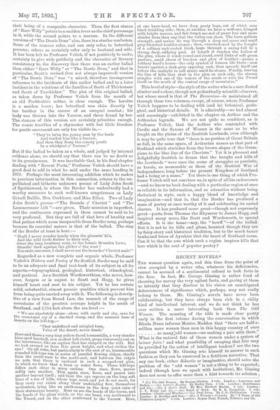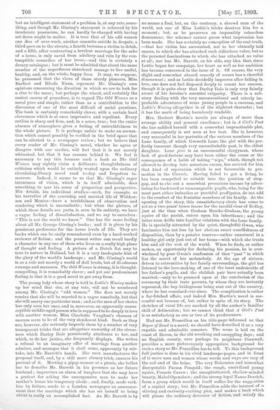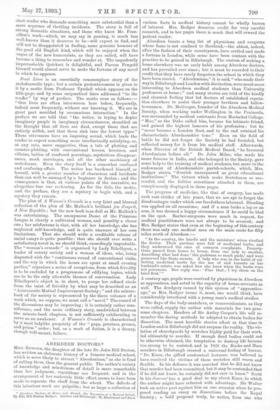RECENT NOVELS.* THE woman question again, and this time from
the point a view occupied by a writer who, whatever his deficiencies, cannot be accused of a sentimental refusal to look facts in the face. In fact, Mr. George Gissing is rather fond of choosing for survey the very ugliest facts, and gazing at them so intently that they disclose to his vision an unmitigated dolorousness of significance which, perhaps, may not really belong to them. Mr. Gissing's novels have never been exhilarating, but they have always been rich in a chilly kind of intellectual interest, and we do not think he has ever written a more interesting book than The Odd Women. The meaning of the title is made clear pretty early in the first volume during the conversation in which Rhoda Nunn informs Monica Madden that "there are half-a- million more women than men in this happy country of ours so many:odd women—no making a pair with them." What is the natural fate of these women under a system of laisser faire? and what possibility of escaping that fate may be provided by the action of intelligent leaders ? are the two questions which Mr. Gissing sets himself to answer in such fashion as they can be answered in a fictitious narrative. That any one book, either didactic or imaginative, should solve the problem of the "odd women" is not a thing to be expected; indeed (though here we speak with hesitation), Mr. Gissing does not seem to offer more than a hint towards its solution ;
• (1.) The Odd Women. By George GIseIn 3 vols. London Lawrence and Lottie's Wooing. By Harley Dale. 3 vols. London : Hutchinson and co.—(3.) / Girl's Past. By Mrs. Herbert Martin. 8 vols. London F. V. White and 00.—(4.) Boos of Sand. By R. B. Franoillon. 3 vole. London Ohatto and Windus.-0.) Dual Lives, By J. G. Millington. 3 vols. London IL. Bentley and Son.—(8.) A Woman's Crusade. By "1 Beano of the Primrose League." 8 vols. London : Kogan Paul, Trench, Trebner, and Os.
but an intelligent statement of a problem is, at any rate, some- thing, and though Mr. Gissing's statement is coloured by his inveterate pessimism, he can hardly be charged with having set down aught in malice. It is true that of his odd women one dies of over-work, another commits suicide in despair, a third goes on to the streets, a fourth becomes a victim to drink, and a fifth, after contracting a loveless marriage for the sake of a home, is only saved from adultery and ruin by the con- temptible cowardice of her lover,—and this is certainly a dreary catalogue; but it must be admitted that about the same number of the superfluous sisterhood manage to live useful, healthy, and, on the whole, happy lives. It may, we suppose, be presumed that the views of those sturdy pioneers, Miss Barfoot and Rhoda Nunn, represent Mr. Gissing's own opinions concerning the direction in which we are to look for a clue to the maze ; but perhaps the wisest, and certainly the easiest course of procedure, is to regard The Odd Women as a novel pure and simple, rather than as a contribution to the discussion of one of the most difficult of social questions. The book is certainly remarkably clever, with a certain hard -cleverness which is at once impressive and repellent. Every outline is sharp and firm, and, in a sense, true ; but the entire absence of atmosphere gives a feeling of untruthfulness to the whole picture. It is perhaps unfair to make an accusa- tion which cannot possibly be verified in the brief apace that ean be allotted to a newspaper review ; but we believe that every reader of Mr. Gissing's novel, whether he agree or disagree with our verdict, will feel that it is not merely whimsical, but that it has reasons behind it. We feel it necessary to say this because such a book as The Odd Women may rightly claim a deliberate thoughtfulness of criticism which would be entirely wasted upon the ordinary circulating-library novel read today and forgotten to- morrow. Indeed, it seems to us that Mr. Gissing's eager intentness of vision, which is in itself admirable, does something to mar his sense of proportion and perspective. His details, his individual studies—such, for example, as his narrative of the courtship and married life of Widdow- son and Monica—have a truthfulness of observation and rendering which is unassailable ; but when the picture, of which these details are parts, is seen in its entirety, we have a vague feeling of dissatisfaction, and we say to ourselves : "This is not the world we know." One has the same feeling about all Mr. George Gissing's books ; and it is given by his persistent preference for the lower levels of life. They are hooks which can be easily remembered even by a hard-worked reviewer of fiction ; and the present writer can recall hardly a character in any one of them who lives on a really high plane of thought and feeling. A picture of a Dutch fiat may be true to nature in Holland, but it is a very inadequate hint of the glory of the world's landscape ; and Mr. Gissing's world is as a rule not merely a world of dull levels, but of ill-odorous swamps and morasses. The Odd Women is strong, it is thought- .compelling, it is remarkably clever; and yet our predominant feeling is that it is a good novel to get away from.
The young lady whose story is told in Lottie's Wooing makes op her mind that she, at any rate, will not be numbered among Mr. Gissing's "odd women." She does not merely resolve that she will be married to a vague somebody, but that she will marry one particular man ; and as the man of her choice has only seen her once, and is, moreover, an apparently unsus- eeptible middle-aged person who is supposed to be deeply in love with another woman, Miss Charlotte Vaughan's chances of success seem to be of the very slenderest kind. Such as they are, however, she seriously imperils them by a number of very transparent tricks that are altogether unworthy of the clever- ness which Darley Dale persistently attributes to her, and which, to do her justice, she frequently displays. She writes a refusal to an imaginary offer of marriage from another admirer, and manages that it shall come, apparently by mis- take, into Mr. Barrett's hands. She next manufactures the proposal itself, and, by a still more clumsy trick, ensures his perusal of it. Meeting a gipsy-woman at a picnic, she bribes her to describe Mr. Barrett in his presence as her future husband ; improvises an alarm of burglars that she may have a pretext for asking the unresponsive man to make her mother's house his temporary abode , and, finally, made reck- less by failure, sends to a London newspaper an announce- ment that the marriage which she has set herself to bring about is really an accomplished fact. As Mr. Barrett is by no means a fool, but, on the contrary, a shrewd man of the world, not one of Miss Lottie's tricks deceives him for a moment ; but, as he preserves an impossibly colourless demeanour, the schemer cannot guess what impression has been made. She has certainly no conception of the real truth, —that her victim has succumbed, not to her clumsily laid snares, to which she has attached such ridiculous value, but to the personal fascinations to which she has attached no value at ; nor has Mr. Barrett, on his side, any idea that, since Lottie began her campaign, her heart as well as her ambition has become concerned in the issue of it. Of course, the very slight and somewhat absurd comedy of errors has a cheerful d¬tement ; and as Lottie decidedly improves after falling in love, one does not feel disposed deeply to resent her success, though it is quite clear that Darley Dale is only very faintly aware of his heroine's essential vulgarity. There is a sub- story dealing with the very unconventional and utterly im- probable adventures of some young people in a caravan, and Loitie's Wooing altogether is of the slightest character; but it has the merit of being harmlessly readable.
Mrs. Herbert Martin's novels are always of more than average ability and general excellence ; but in A Girl's Past she has saddled herself with a somewhat impracticable plot, and consequently is not seen at her best. She is, however, very successful in her portraits of the various members of the Lane family, of which Gweneth Lane, the girl with the per- fectly innocent though very uncomfortable past, is the eldest daughter. Lane Fire is an unsuccessful clergyman, whose lack of good-fortune may have been either the cause or the consequence of a habit of taking 'nips," which, though not allowed to develop into notorious excess, has secured for him that kind of reputation which is not favourable to pro- motion in the Church. Having failed to get a living, he has been compelled to subside into the position of stop- gap, and to eke out a somewhat precarious income by adver- tising for backward or unmanageable pupils, who, being for the most part either imbeciles or youthful profligates, do not add to the comfort of the feminine members of his family. At the opening of the story, this unsatisfactory cleric has come to act as a two-years' locust tenens for the invalid vicar of Erdley, just at the time when Graham Brooke-Graham, the young squire of the parish, enters upon his inheritance ; and the latter soon drifts into familiar relations with the Lane family. He is specially attracted by the quiet, thoughtful Gwen, who fascinates him not less by her obvious sweet unselfishness of disposition, than by a pensive reserve—rather unnatural in a healthy girl only just out of her teens—with which she treats him and all the rest of the world. When he finds, or rather makes, an opportunity for declaring his passion, he is over- whelmed by poor Gwen's confession of that " past " in which lies the secret of her melancholy. At the age of sixteen, driven to extremities by her family surroundings, the girl has listened to the love-making of one of the least undesirable of her father's pupils, and the childish pair have actually been married,—only to be pounced upon at the conclusion of the ceremony by their irate parents, by whom they are instantly separated, the boy-bridegroom being sent out of the country, where he has remained ever since. The complication is rather a far-fetched affair, and indeed Mrs. Martin's novel is suc- cessful not because of, but rather in spite of, its story. The sketches of rural life are marked by all the author's familiar skill of delineation ; but we cannot think that A Girl's Past is as satisfactory as one or two of its predecessors.
Had not Mr. Francillon on his title-page informed us that Ropes of Sand is a novel, we should have described it as a very capable and admirable romance. The scene is laid on the coast of Devon, in the old wrecking and smuggling days ; and no English county, save perhaps its neighbour Cornwall, provides a more picturesquely appropriate background for such a story as Mr. Francillon has to te]l. To this background full justice is done in his vivid landscape-pages, and in front of it move men and women whose words and ways are racy of the soil and of the brine. The very Bohemian and somewhat disreputable Parson Pengold; the rough, uncivilised young squire, Francis Carew; the unsophisticated, shallow-minded beauty, Mabel Openshaw ; and the strong, loyal Nance Derrick, form a group which would in itself suffice for the suggestion of a capital story ; but Mr. Francillon adds the interest of a stirring and curiosity-exciting plot, and makes a book which will please the ordinary devourer of fiction, and satisfy the elect reader who demands something more substantial than a mere sequence of thrilling incidents. The story is full of strong dramatic situations, and those who know Mr. Fran- efflon's work—which, we may say in passing, is much less well-known than it deserves to be—will expect to find, and will not be disappointed in finding, some genuine humour of the good old English kind, which will be enjoyed. when the vogue of the new humourists, as they are called, will have become a thing to remember and wonder at. The impudently imperturbable Quickset is delightful, and Parson Pengold himself would almost serve to make the fortune of any novel in which he appears.
Dual Lives is an essentially commonplace story of the melodramatic type ; but a certain pretentiousness is given to it by a motto from Professor Tyndall which appears on the title-page, and by some enigmatical lines addressed "to the reader" by way of preface. The motto runs as follows :— "Our lives are often interwoven here below, frequently, indeed most frequently, without our knowing it. We are in great part moulded by unconscious interaction." In the preface we are told that "the writer, in trying to depict imaginary people in imaginary circumstances, stumbled on the thought that all lives are dual, except those that are entirely selfish, and that these sink into the lowest types." These utterances have an imposing sound, which leads the reader to expect something more intellectually satisfying, or, at any rate, more suggestive, than a tale of plotting and counter-plotting, with conventional heroes, heroines, and villains, babies of confused parentage, mysterious disappear- ances, mock marriages, and all the other machinery of melodrama. Even the story itself is a somewhat confused and confusing affair. The writer has burdened himself, or herself, with a greater number of characters and incidents than can well be managed by a beginner in fiction ; and the consequence is that, at various points of the narrative, we altogether lose our reckoning. As for the title, the motto, and the preface, they are a mystery to begin with, and a mystery they remain.
The plan of I Woman's Crusade is a very faint and blurred reflection of the plan of Mr. Mallock's brilliant jeu d'esprii, A New Republic; but the new book is as dull as Mr. llallock's was entertaining. The anonymous Dame of the Primrose League is clearly a cultivated woman, and possibly a clever one ; her misfortune is that, with all her knowledge, she has neglected self-knowledge, and is quite unaware of her own limitations. That she should write a creditable volume of social essays is quite possible that she should ever write a satisfactory novel is, we should think, exceedingly improbable. The "woman's crusade" is organised by Lady Ethelhyrst, a leader of county society and a woman of ideas, who, being disgusted with the "continuous round of conventional visits, and the way in which the hours are spent at small evening parties," organises a series of receptions, from which frivolity is to be excluded by a programme of edifying topics, which are to be the only allowable themes of conversation. Lady Ethelhyrst's object is, in short, to purge her refined circle from the taint of frivolity by what may be described as an *" Aristocratic Mutual Improvement Society ; "and the minute- book of the society is represented by the three volumes of a work which, we suppose, we must call a "novel." The record of the discussions may be improving; it is certainly rather som- niferous; and the more ordinary story, sandwiched between the minute-book chapters, is not sufficiently exhilarating to serve as an awakener. A Woman's Crusade is characterised by a most ladylike propriety of the "papa, potatoes, prunes, and prism" order; but, as a work of fiction, it is a dreary, though well-meant, failure.




































 Previous page
Previous page